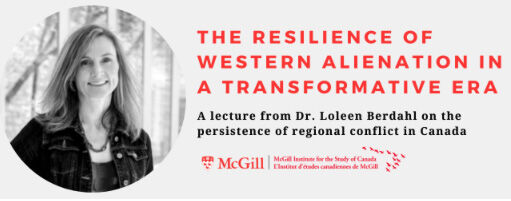Western Separatism the focus of a free webinar
Posted on 3 February 2021 by Ryan Dahlman Separatism to be discussed
Separatism to be discussedThe talk of separating from Canada by the western provinces, including loud cries from some Albertans, have increased over the pas number of months as topics such as equalization payments, energy policy decisions and even something like favouritism for economic bailouts for eastern companies over western ones are all part of the problem.
A webinar, co-hosted and co-organized by the Centre for the Study of Democratic Citizenship.
McGill University, will be held Feb. 12 discussing western alienation. “The Resilience of Western Alienation in a Transformative Era” will feature Dr. Loleen Berdahl, Executive Director, Johnson Shoyama Graduate School of Public Policy, University of Saskatchewan and University of Regina.
In the McGill webinar description, “Dr. Berdahl argues that Canada’s national unity challenges come from the alienation of alternative perspectives. She further argues that the study of western alienation allows us to delve into the structural features of Canadian federalism that exacerbate rather than moderate regional conflict in our vast and diverse country.”
Berdahl is looking forward to the discussion that will have a question and answer period following.
“My discussion will cover the persistence of western alienation over time, and I will make the case that western alienation is not about a specific policy issue, economic circumstance, or government,” explains Berdahl. who will be the lone speaker. “I will cover the history of western alienation and discuss what I believe to be its root cause… Economic matters have always been central to western alienation but policy issues are only part of the equation. Western alienation really comes down to perception of being disrespected and insufficient influence in national decision-making.
“Western” alienation is primarily an Alberta and Saskatchewan issue. The sentiments in BC and Manitoba are different — in fact, B.C. is currently second to Ontario in terms of being most satisfied with how it is treated in Canada. I believe that the sentiment of western alienation will persist but that we will increasingly see counter-narratives emerging in Alberta and Saskatchewan.”
Berdahl has not just started studying Western Canada and following the alienation story recently. She has spent decades working on it.
She has been studying western Canada since 1998 when she started working at the Canada West Foundation. Berdahl served as the Director of Research at the Canada West Foundation and during my ten years at the Foundation her research focused primarily on the role of the West in Canada.
In 2008 she joined the University of Saskatchewan and continued her research on western Canada. Thus far she has written two books (co-authored with Roger Gibbins) and numerous policy papers and academic articles.
The social climate is in turmoil right now, but she doesn’t believe hot button has necessarily caused this new push for western independence. She says the pandemic for example, hasn’t made that any different.
“”Economic matters have always been central to western alienation but policy issues are only part of the equation. Western alienation really comes down to perception of being disrespected and insufficient influence in national decision-making…. Public opinion data show that western alienation declined after Covid started. This doesn’t mean that Covid had an effect, though, as alienation was very high after the 2019 federal election,” explains Berdahl, but believes the energy sector is different.
“Keystone’s cancellation creates more economic stress for Alberta and Saskatchewan. This will likely contribute to increased western alienation, particularly if the premiers put forward a strong argument that the Trudeau government could have done more or should be doing more to save the project.”
The webinar goes Feb. 12 with a 1 p.m. in ALberta and 2 p.m. in Regina.
To register for the free webinar, go to: https://us02web.zoom.us/webinar/register/WN_ZdpS2dsETXK722vt8DCLAQ
Leave a Reply
You must be logged in to post a comment.
